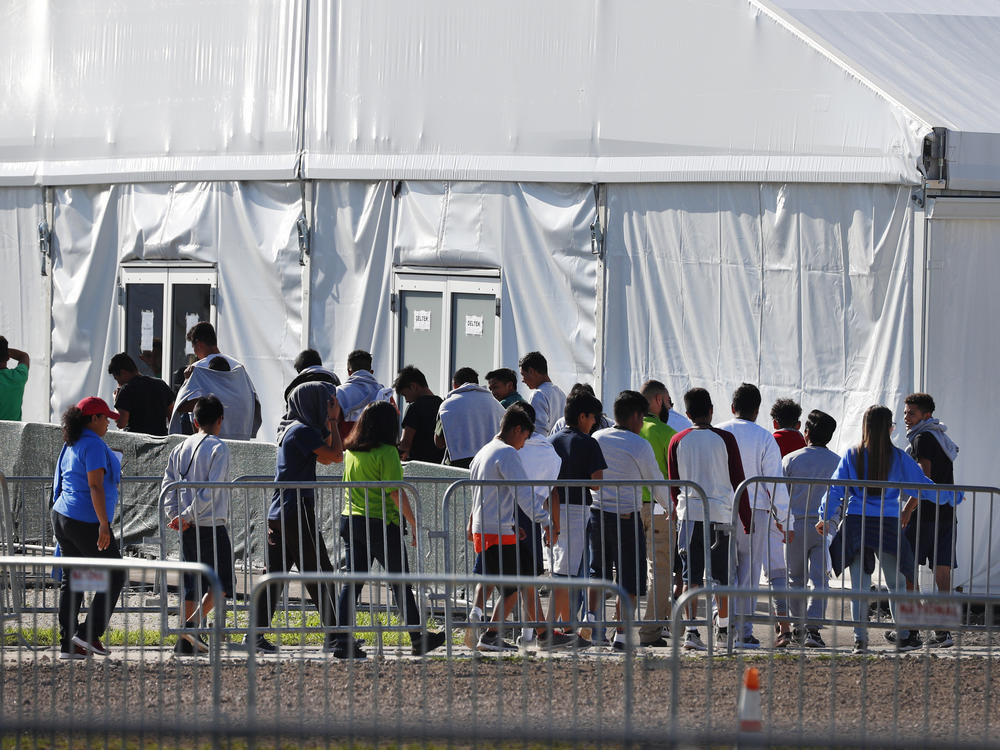Section Branding
Header Content
Justice Department breaks off talks on compensation for separated families
Primary Content
The Department of Justice has broken off negotiations to pay monetary damages to families who were forcibly separated at the border during the Trump administration.
The negotiations, which began in the early months of the Biden administration, were aimed at settling claims brought by migrant families that were separated under the "zero tolerance" policy while seeking to enter the U.S. for asylum and other reasons.
But government officials abruptly pulled the plug on all settlement talks on Thursday, Lee Gelernt, a lawyer at the American Civil Liberties Union, and one of the lead negotiators told NPR.
Gelernt said the Justice Department did not explain why it was walking away from the talks.
"We can see no reason for this other than this administration does not want to use any political capital to help these children," Gelernt said in an interview. "History will not judge this decision kindly."
In a statement, the Department of Justice said the parties have been unable to reach a settlement, but "we remain committed to engaging with the plaintiffs and to bringing justice to the victims of this abhorrent policy."
The controversial immigration policy was dismantled within Biden's first week as president.
In all, the Trump administration separated more than 5,000 families who crossed into the U.S. without visas. Under the policy adults who entered the U.S. from the southern border were prosecuted for illegal entry. Because children cannot be imprisoned with adults, the young kids were taken into separate federal facilities.
Government reports ultimately found the administration had no clear plan nor had it allocated resources to help reunite parents or guardians with their children when it implemented the zero tolerance enforcement policy. Hundreds of families remain separated, many more say they are still suffering the effects of the separation. More than 100 have brought claims seeking monetary damages from the government, Gelernt said.
Republicans and Democrats appeared united against the draconian policy, calling it a humanitarian failure. President Biden called it a "moral and national shame." And settlement talks proceeded quietly behind closed doors for several months — until October, when the Wall Street Journal broke the story that financial compensation amounts could reach as high as $450,000 per person in some cases.
At that point, the negotiations became a political liability for Biden and his administration who came under fire by Republicans in Washington.
Lawyers representing families who'd been torn apart, have insisted most settlement amounts would be far lower, But the story generated enormous outrage among GOP members, who tried to link the issue to the soaring number of arrests at the southern border. They argued that giving large cash settlements to migrant families would encourage more illegal immigration.
In a Department of Homeland Security hearing on immigration last month, Sen. Chuck Grassley, R-Iowa, said he takes the entire concept of compensation as a personal affront.
"As you can imagine, many Americans think it's a pretty outrageous idea to offer massive taxpayer funded payments to illegal immigrants who broke our laws," Grassley told DHS secretary Alejandro Mayorkas, blaming the Biden administration for the current immigration crisis.
Grassley noted that the families of service members who die on active duty receive a tax repayment of $100,000. "Under what circumstances, if any do you think it's appropriate for an illegal immigrant who broke our laws to receive more money from the government than the family of a fallen service member," he asked.
Biden administration officials and the president himself were asked frequently about the settlement talks, which appeared likely to become an election-year issue in 2022.
Lawyers representing the families say they're deeply disappointed and contend everyone who was a victim of the zero tolerance approach deserves recompense, including financial settlements. They also say the government could easily wind up spending even more money fighting these cases than if it had simply reached a settlement.
The Women's Refugee Commission condemned the decision by the Justice Department to pull out of the negotiations.
"This move is a shameful, profound betrayal of the government's responsibility to redress the harms of this heinous policy," Katharina Obser, director of the Migrant Rights and Justice program with the group, said in a statement.
"While the U.S. can never undo what happened, we expected the Biden administration to engage in good faith with efforts for redress and repair," she said, adding that "the cruelty of intentionally tearing families apart inflicted unspeakable and permanent trauma on children and their parents coming to the U.S. border seeking safety."
Kathryn Hampton, deputy director of the Physicians for Human Rights Asylum Program, also noted the long term effects of the separation on children. The organization has documented the psychological harms and trauma many have suffered, including PTSD, depression, and anxiety.
"Instead of bowing to right-wing ideologues, the Biden administration should pursue justice and accountability for the deeply traumatized children and parents who endured these atrocious acts perpetrated by the United States government," Hampton said in a statement.
The Biden administration says it will continue to identify and reunify families that were separated under the Trump administration.
Meanwhile, the ACLU is in negotiations with the administration over other issues, including the possibility of legal status for separated families. Those talks will continue, Gelernt said — but the end of financial negotiations won't make them any easier.
Copyright 2021 NPR. To see more, visit https://www.npr.org.

